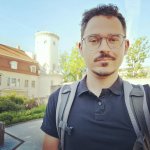
Daniel Dörler
New podcast: Fossilfinder
Have you already listened to our latest podcast episode? You can listen to the latest episode with Fossilfinder project manager Alexander Lukeneder directly on the Österreich forscht blog. Give it a listen!
New podcast: My Tune
Have you already listened to the latest episode of our podcast "Wissen macht Leute"? In the accompanying blog post, you can hear what the My Tune project is all about and what the two project coordinators have learnt from the project. Listen in!
Registration for ECSA/ACSC double conference
Registration for the big ECSA/ACSC double conference in April 2024 in Vienna is now open! Take a look and register for this mega event!
New project: Stories of Post-extractive F*utures
The shrinking town of Eisenerz lies at the foot of the Erzberg mountain, Austria’s largest and best-known site of extraction of iron ore. The post-industrial town is experiencing a rural exodus, which concerns women in particular. The spatial practices of mining areas have been under-researched using inclusive methods. Mining is predominantly narrated in male, heroic narratives, while counter-narratives of repair, care, reproduction and maintenance are mostly overlooked. Within this complex field, the new project Stories of Post-extractive F*utures focuses on intersectional feminist perspectives on an area of exhaustion; it will collect feminist post-extractive stories to broaden the perception of mining areas and strengthen the focus on feminist narrations for future perspectives.
New project: Restore4Life
What can we do to protect our wetlands and floodplains in Europe? What does the water management need to implement measure for the benefit of both the environment and the human society? The Horizon Europe project Restore4Life, which can now also be found on Österreich forscht, aims at offering an online system that supports the restoration of wetlands in Europe. Check out the description on Österreich forscht and join the project!
New project: City Layers
The project "City Layers: Citizen Mapping as a Practice of City-Making" of the Vienna University of Technology, funded by the Austrian Science Fund (FWF), presents a contemporary framework for urban mapping, focussing on the observation and recording of urban spaces by citizens in order to contribute to a more egalitarian urban design. As of recently, this exciting project can also be found on Österreich forscht! Have a look and join the project!
New project: U3Green
The development of child- and youth-friendly cities is becoming increasingly important due to the deteriorating quality of life in urban areas. An important contribution to this relates to the provision of urban green suitable for young people and their involvement in the future design of urban landscapes.This is the aim of the new project U3Green on Österreich forscht. Check out the project website and join this fascinating new project!
New project: Mosquito Alert
Mosquito Alert is a citizen science project that allows tiger mosquitoes and other mosquitoes to be easily reported using a free app.Tiger mosquitoes are non-native mosquitoes that originally come from Asia. In recent decades, this species has spread widely in Europe. Tiger mosquitoes are not only a nuisance, they can transmit a variety of pathogens (e.g. the Zika virus or the dengue virus). If tiger mosquitoes spread in Austria, these diseases could also be transmitted in our country. In addition to tiger mosquitoes, other mosquito species can be reported with the app. Find out more about this exciting new project on Österreich forscht! Join the project!
New project: AmphiBiom
The AmphiBiom project is focused on the study of the European green toad in Austria. With the support of Citizen Scientists, the project team investigates the distribution of this endangered amphibian species, which, as a typical pioneer species, can quickly colonize newly emerging water bodies. If you want to know more about this fascinating new project, have a look at the project description on Österreich forscht.
New project: My Tune
How should music therapy be structured so that it works well from the participants' point of view? This is being investigated in the My Tune project together with clients. You can find out how the project works on Österreich forscht! Join in the research!

